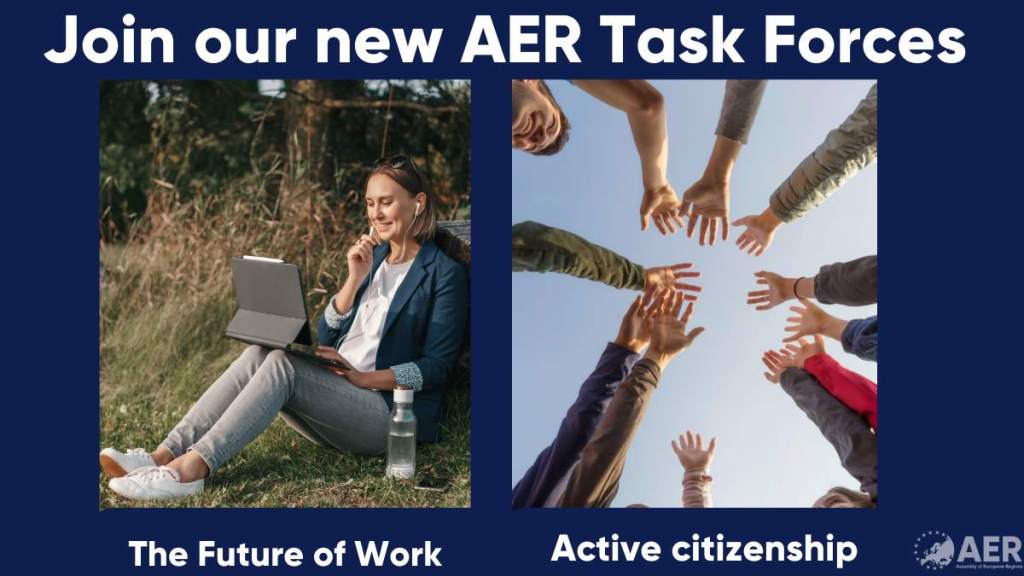 Share this!
Share this!During the 2022 Autumn Bureau Meeting, the AER members decided to establish two new Taskforces which will address the political priorities of the Bureau for the period of 2023-2025.
Taskforce on Active Citizenship
Why?
The year 2022 has been key in setting a precedent for strengthening our democracies by enabling new participatory processes and putting citizens’ interests at the centre of decisions. Capitalising on the work of the Taskforce on Democracy, and with the end of the Conference on the Future of Europe, the AER recognises the need for continuing the path towards activating citizens’ participation through deliberative democracy mechanisms in place.
The Conference on the Future of Europe has offered the opportunity to enhance deliberative democracy at the European level by bringing the EU closer to its citizens and building a more citizen-focused Europe. Providing an alternative to traditional participatory routes, new representative deliberative processes have been established for better engagement and involvement of citizens in policy-making at all levels of governance.
In 2023, the European Commission will launch a new EU package to defend democracy, which will be part of the overall European Democracy Action Plan. This package will focus among others, on developing civic space and promoting citizen participation to bolster democratic resilience.
What?
In view of the European elections in 2024, the AER calls on regional and local authorities to foster active citizenship by seeking innovation for greater participation of citizens in public decision-making. Thanks to the provision of the necessary deliberative participation tools and instruments, citizens will be able to be meaningfully involved in the democratic life of their local communities and resulting in more democratic governance.
Capitalising on the work of the Taskforce on Democracy, the AER will continue to ensure broad and equal participation of both women and men in political decision-making, as well as recognise the key role that young people can play in strengthening democracy and fostering sustainability in local communities.
How?
Does the focus of this Taskforce match the policy priorities of your region? Then become a member by filling out the form below!
Any questions? Contact Gisela Guari [email protected], Institutional Relations & Advocacy Manager at the AER Secretariat.
For any doubts or questions on the functioning of the Bureau Taskforces, please, check the Bureau Taskforce Terms of Reference.
Taskforce on the Future of Work – Digital Skills
Why?
During the 2022 State of the Union speech, the President of the European Commission announced that 2023 will be “the European Year of Skills”.
Regions are already finding innovative ways to drive inclusive economic growth and job creation in light of the post-pandemic shift away from traditional office-based work. For instance, remote working—particularly in rural areas—will offer economic, social, cultural, environmental and territorial benefits, and enhance territorial cohesion.
Since the pandemic and the normalisation of working from home, remote working hubs have proliferated across Europe and in AER’s member regions. With the right mix of digital, childcare and transport infrastructure, remote working and digital innovation hubs are re-balancing economic activity towards rural areas and beyond urban centres. This new economic model can be a driving force for true territorial cohesion across Europe.
There is a double benefit to bringing local people and their families back to rural communities: it increases entrepreneurship and job creation and reverses demographic, cultural and linguistic erosion caused by economic emigration—the so-called ‘brain-drain’ phenomenon. There are real benefits for urban areas, too; reduced pressure on school places, housing, water, sewerage and transport systems, as well as cuts to harmful emissions caused by commuter traffic.
Indeed, marginalised and vulnerable groups (migrants, older people, NEETs, etc) may not reap the benefits of these new opportunities; lacking the computer literacy, language or human skills necessary to work remotely. More broadly, there is a skills mismatch between emerging labour market demands in new sectors and graduate qualifications; this gap must be narrowed to ensure that no one is left behind by this transition. Many peripheral regions also lack the capital resources, infrastructure or know-how to set up innovation or remote working hubs without significant support.
Making progress towards the achievement of the 2030 Agenda for Sustainable Development, and realising the potential of the digital and green transitions in our regions, towns, cities and villages; it is imperative that the gap between vulnerable groups and urban and rural societies is not widened.
What?
Capitalising on the work of the AER Taskforce on Jobs, Growth, and Investment, and taking into consideration the key recommendations from its position paper, the AER urges European governments and institutions to further invest in developing the skills needed to drive growth, and support the transition to a green and digital economy. Regions are playing a crucial role in supporting our societies through the digital transition; while overcoming the urban-rural divide to ensure no one is being left behind.
Inclusive growth and job creation in new sectors and contexts will strongly depend on a skilled, reskilled and upskilled workforce with a set of digital competences adapted to new needs and work trends. In this regard, the members of the AER decided to establish during the last Autumn Bureau Meeting 2022 a Taskforce on the Future of Work and Skills.
The future of work has arrived in our regions, and it is in our hands to ensure that regional authorities and their citizens have the high-quality digital skills they need to thrive in the new labour market. At the AER, we stand ready to prepare our members to meet the challenges of the recovery and the twin transitions, promoting Europe’s social, economic and territorial cohesion.
How?
Does the focus of this Taskforce match the policy priorities of your region? Then become a member by filling out the form below!
Any questions? Contact Gisela Guari [email protected], Institutional Relations & Advocacy Manager at the AER Secretariat.
For any doubts or questions on the functioning of the Bureau Taskforces, please, check the Bureau Taskforce Terms of Reference.
